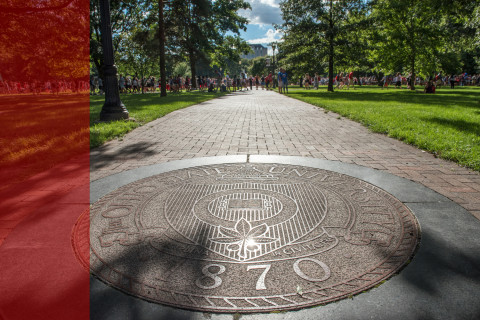Hospitality Management

Effective for students admitted to the College of Education and Human Ecology beginning Summer 2023
General Education Requirements (32-39 hours)
Bookends (2 hours)
- Launch Seminar (1)
- Reflection Seminar (1)
Foundations (22-25 hours)
- Writing & Information Literacy (3)
- Mathematical & Quantitative Reasoning or Data Analysis (3-5)
- Literary, Visual & Performing Arts (3)
- Historical & Cultural Studies (3)
- Natural Science (4-5)
- Social & Behavioral Sciences (3)
- Race, Ethnic & Gender Diversity (3)
Thematic Pathways (8-12 hours)
Take 4-6 hours from Citizenship for a Diverse & Just World and 4-6 hours from another Thematic Pathway of choice.
- Citizenship for a Diverse & Just World
- Choice of 4-6 hours from one additional Thematic Pathway:
- Lived Environments
- Origins & Evolution
- Migration, Mobility, & Immobility
- Sustainability
- Traditions, Cultures, & Transformations
- Health & Wellbeing
- Number, Nature, Mind
College Requirement (1 hour)
- EHE 1100 College Survey (1 hour)
Major Requirements (38-55 hours)
Interdisciplinary Core (16 hours)
- CSHSPMG/CSFRST 2300 Branding in Fashion, Hospitality, and Sport Industries (3)
- CSHSPMG/CSFRST/CSCFFS 3910 Customer Experience Management (3)
- CSHSPMG/CSFRST 3330 Corporate Social Responsibility, Sustainability & Entrepreneurship in Fashion & Hospitality Indus (3)
- CSHSPMG/CSFRST 3950 Use of Social Media and IT in Fashion, Hospitality, and Sport Industries (3)
- CSHSPMG/CSFRST 4680 Strategic Management in Fashion & Hospitality Industries (3)
- CSHSPMG 2990 Professional Development (1)
Supporting Course Requirements (6 hrs)
- CSHSPMG/CSFRST 2100 Profit-Centered Merchandising and Hospitality (3)
- CSHSPMG 5640 Marketing in Hospitality Enterprises (3)
Complete either Option A or Option B requirements
Option A (33 hours)
Option A Major Core Requirements (21)
- CSHSPMG 2600 Introduction to Hospitality Management (3)
- CSHSPMG 2700 Principles of Food Production Management (3)
- CSHSPMG 2710 Principles of Food Production Management Laboratory (1)
- CSHSPMG 2800 Hotel Management (3)
- CSHSPMG 2810 Hotel Management Practicum (1)
- CSHSPMG 3700 Controlling Food, Beverage, and Labor Costs (3)
- CSHSPMG 3720 Food Service Management (3)
- CSHSPMG 3730 Food Service Management Practicum (1)
- CSHSPMG 3191 Internship (3)
Option A Major Advanced Courses
Choose at least 12 hours from the following: (Course hours listed in parenthesis) (12)
- CSHSPMG 4600 Special Events Planning and Management (3)
- CSHSPMG 4610 Beverage Management (3)
- CSHSPMG 4620 Tourism & Culture (3)
- CSHSPMG 4650 Human Resources in the Hospitality Industry (3)
- CSHSPMG 4750 Casino Operations (3)
- CSHSPMG 4798 Tourism & Culture Study Abroad (3)
- CSHSPMG/CSFRST 5555 Management Consulting for Hospitality and Fashion Retail Operations (3)
- CSHSPMG/CSFRST 5780 Leadership for the Service Industry (3)
- CSHSPMG 5820 Revenue Management in the Hospitality Industry (3)
- CONSCI 5333 Finding Happiness in the Classroom, Workplace, and Beyond (3)
- CONSCI 5193 Individual Studies in Consumer Sciences (1-4)
Option B (16 hours)
Admission criteria: Applied Associate degree in related field, including but not limited to:
- Hospitality Management
- Culinary Apprenticeship
- Hotel, Tourism & Event Management
- Restaurant & Foodservice Management
Option B Major Core Requirements (12)
- CSHSPMG 3700 Controlling Food, Beverage, and Labor Costs (3)
- CSHSPMG 4600 Special Events Planning and Management (3)
- CSHSPMG 4610 Beverage Management (3)
- CSHSPMG/CSFRST 5780 Leadership for the Service Industry (3)
Option B Major Supporting Courses
Choose 4 hours from the following: (Course hours listed in parenthesis) (4)
- CSHSPMG 2800 Hotel Management (3)
- CSHSPMG 2810 Hotel Management Practicum (1)
- CSHSPMG 3720 Food Service Management (3)
- CSHSPMG 3730 Food Service Management Practicum (1)
Total Hours: 71-95
Free Electives to reach 120 Hours: 25-49
Minimum of 120 credit hours required for degree completion. Total Hours range is based on requirement course choices and/or the number of credits that overlap between requirement areas. Students are encouraged to overlap as many credits as possible
